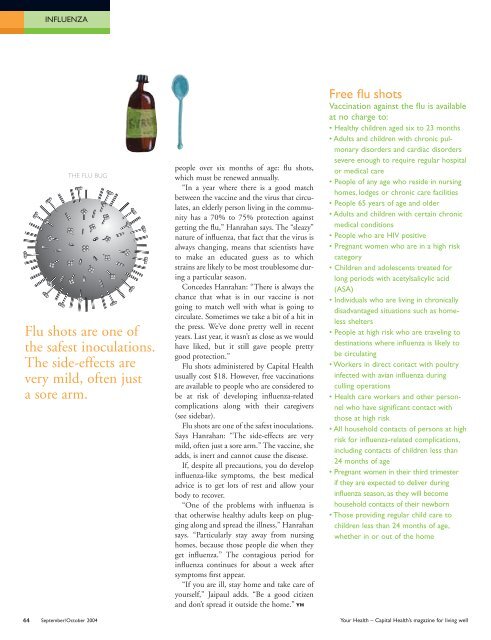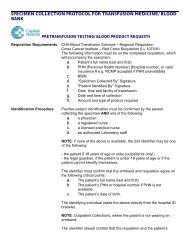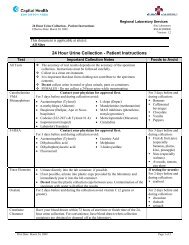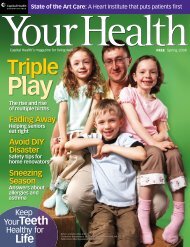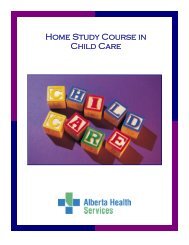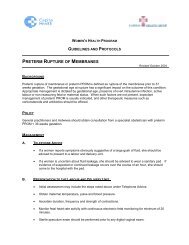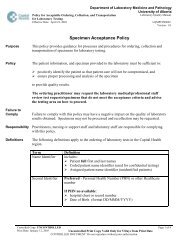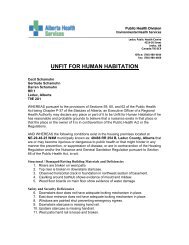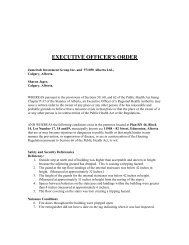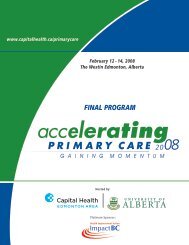PORTRAITS PORTRAITS - Capital Health
PORTRAITS PORTRAITS - Capital Health
PORTRAITS PORTRAITS - Capital Health
Create successful ePaper yourself
Turn your PDF publications into a flip-book with our unique Google optimized e-Paper software.
INFLUENZA<br />
THE FLU BUG<br />
Flu shots are one of<br />
the safest inoculations.<br />
The side-effects are<br />
very mild, often just<br />
a sore arm.<br />
people over six months of age: flu shots,<br />
which must be renewed annually.<br />
“In a year where there is a good match<br />
between the vaccine and the virus that circulates,<br />
an elderly person living in the community<br />
has a 70% to 75% protection against<br />
getting the flu,” Hanrahan says. The “sleazy”<br />
nature of influenza, that fact that the virus is<br />
always changing, means that scientists have<br />
to make an educated guess as to which<br />
strains are likely to be most troublesome during<br />
a particular season.<br />
Concedes Hanrahan: “There is always the<br />
chance that what is in our vaccine is not<br />
going to match well with what is going to<br />
circulate. Sometimes we take a bit of a hit in<br />
the press. We’ve done pretty well in recent<br />
years. Last year, it wasn’t as close as we would<br />
have liked, but it still gave people pretty<br />
good protection.”<br />
Flu shots administered by <strong>Capital</strong> <strong>Health</strong><br />
usually cost $18. However, free vaccinations<br />
are available to people who are considered to<br />
be at risk of developing influenza-related<br />
complications along with their caregivers<br />
(see sidebar).<br />
Flu shots are one of the safest inoculations.<br />
Says Hanrahan: “The side-effects are very<br />
mild, often just a sore arm.” The vaccine, she<br />
adds, is inert and cannot cause the disease.<br />
If, despite all precautions, you do develop<br />
influenza-like symptoms, the best medical<br />
advice is to get lots of rest and allow your<br />
body to recover.<br />
“One of the problems with influenza is<br />
that otherwise healthy adults keep on plugging<br />
along and spread the illness,” Hanrahan<br />
says. “Particularly stay away from nursing<br />
homes, because those people die when they<br />
get influenza.” The contagious period for<br />
influenza continues for about a week after<br />
symptoms first appear.<br />
“If you are ill, stay home and take care of<br />
yourself,” Jaipaul adds. “Be a good citizen<br />
and don’t spread it outside the home.” YH<br />
Free flu shots<br />
Vaccination against the flu is available<br />
at no charge to:<br />
• <strong>Health</strong>y children aged six to 23 months<br />
• Adults and children with chronic pulmonary<br />
disorders and cardiac disorders<br />
severe enough to require regular hospital<br />
or medical care<br />
• People of any age who reside in nursing<br />
homes, lodges or chronic care facilities<br />
• People 65 years of age and older<br />
• Adults and children with certain chronic<br />
medical conditions<br />
• People who are HIV positive<br />
• Pregnant women who are in a high risk<br />
category<br />
• Children and adolescents treated for<br />
long periods with acetylsalicylic acid<br />
(ASA)<br />
• Individuals who are living in chronically<br />
disadvantaged situations such as homeless<br />
shelters<br />
• People at high risk who are traveling to<br />
destinations where influenza is likely to<br />
be circulating<br />
• Workers in direct contact with poultry<br />
infected with avian influenza during<br />
culling operations<br />
• <strong>Health</strong> care workers and other personnel<br />
who have significant contact with<br />
those at high risk<br />
• All household contacts of persons at high<br />
risk for influenza-related complications,<br />
including contacts of children less than<br />
24 months of age<br />
• Pregnant women in their third trimester<br />
if they are expected to deliver during<br />
influenza season, as they will become<br />
household contacts of their newborn<br />
• Those providing regular child care to<br />
children less than 24 months of age,<br />
whether in or out of the home<br />
44 September/October 2004 Your <strong>Health</strong> – <strong>Capital</strong> <strong>Health</strong>’s magazine for living well


